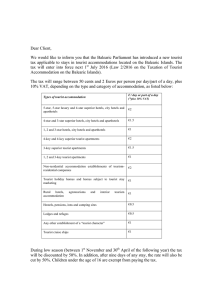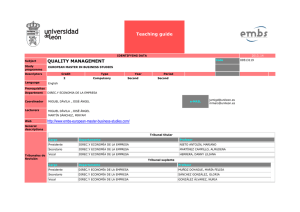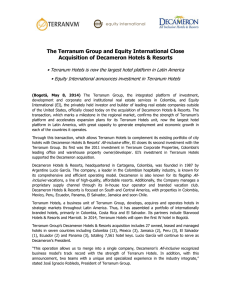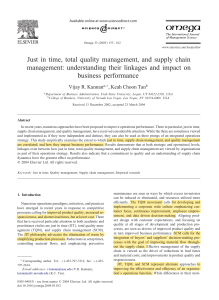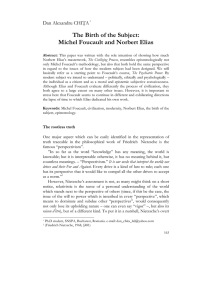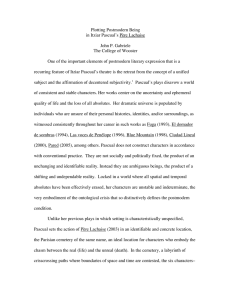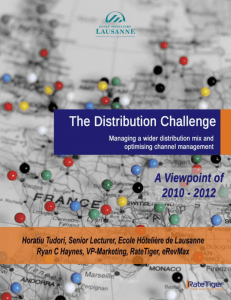Quality systems in the tourism sector
Anuncio
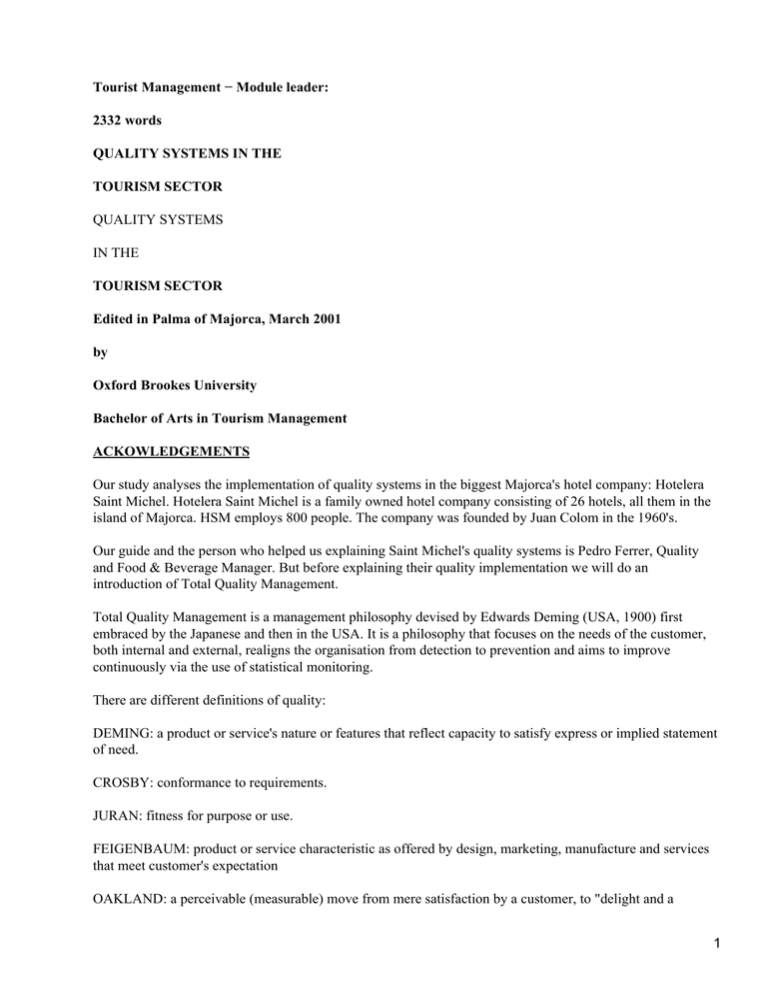
Tourist Management − Module leader: 2332 words QUALITY SYSTEMS IN THE TOURISM SECTOR QUALITY SYSTEMS IN THE TOURISM SECTOR Edited in Palma of Majorca, March 2001 by Oxford Brookes University Bachelor of Arts in Tourism Management ACKOWLEDGEMENTS Our study analyses the implementation of quality systems in the biggest Majorca's hotel company: Hotelera Saint Michel. Hotelera Saint Michel is a family owned hotel company consisting of 26 hotels, all them in the island of Majorca. HSM employs 800 people. The company was founded by Juan Colom in the 1960's. Our guide and the person who helped us explaining Saint Michel's quality systems is Pedro Ferrer, Quality and Food & Beverage Manager. But before explaining their quality implementation we will do an introduction of Total Quality Management. Total Quality Management is a management philosophy devised by Edwards Deming (USA, 1900) first embraced by the Japanese and then in the USA. It is a philosophy that focuses on the needs of the customer, both internal and external, realigns the organisation from detection to prevention and aims to improve continuously via the use of statistical monitoring. There are different definitions of quality: DEMING: a product or service's nature or features that reflect capacity to satisfy express or implied statement of need. CROSBY: conformance to requirements. JURAN: fitness for purpose or use. FEIGENBAUM: product or service characteristic as offered by design, marketing, manufacture and services that meet customer's expectation OAKLAND: a perceivable (measurable) move from mere satisfaction by a customer, to "delight and a 1 reputation for excellence". Customer expectations are consistently met with an afterglow. All quality policy must follow the Demming's fourteen steps for management: 1 − Create constancy of purpose toward improvement of product and service, with the aim to become competitive and to stay in business, and to provide jobs. 2 − Adopt the new philosophy. We are in a new economic age. 3 − Cease dependence on inspection to achieve quality. Eliminate the need for inspection on a mass basis by building quality into the product in the first place. 4 − End the practice of awarding business on the basis of price tag. Instead, minimise total cost. Move toward a single supplier for any one item, on a long−term relationship of loyalty and trust. 5 − Improve constantly and forever the system of production and service, to improve quality and productivity, and thus constantly decrease costs. 6 − Institute training on the job. 7 − Institute leadership. The aim of supervision should be to help people and machines and gadgets to do a better job. Supervision of management is in need of overhaul as well as supervision of production workers. 8 − Drive out fear, so that everyone may work effectively for the company. 9 − Break down barriers between departments. People in research, design, sales, and production must work as a team, to foresee problems of production and in use that may be encountered with the product or service. 10 − Eliminate slogans, exhortations, and targets for the work force asking for zero defects and new levels of productivity. Such exhortations only create adversarial relationships, as the bulk of the causes of low quality and low productivity belong to the system and thus lie beyond the power of the work force. 11 − a. Eliminate work standards (quotas) on the factory floor. Substitute leadership. b. Eliminate management by objective. Eliminate management by numbers, numerical goals. Substitute leadership. 12 − a. Remove barriers that rob the hourly worker of his right to pride of workmanship. The responsibility of supervisors must be changed from sheer numbers to quality. b. Remove barriers that rob people in management and in engineering of their right to pride of workmanship. This means, inter alia, abolishment of the annual merit rating and of management by objective. 13 − Institute a vigorous program of education and self−improvement. 14 − Put everybody in the company to work to accomplish the transformation. The transformation is everybody's job. The organisation needs to: − Create an inspiring vision and enable others to achieve it − Encourage excellence and empower quality people 2 − Make a long−term commitment to quality − Invest time, energy, patience and determination. In tourism industry, the final client is the tourist, the goal is tourist satisfaction. Erik Cohen defines a tourist as follows: A tourist is a voluntary, temporary traveller, travelling in the expectations of pleasure from the novelty and change experienced on a relatively long and non−recurrent round−trip. Production environments that use modern quality control methods are dependant upon statistical literacy. The tools used are called the seven quality control tools. These include: Check Sheet, Pareto Chart, Flow Chart, Cause and Effect Diagram, Histogram, Scatter Diagram and Control Chart. E.g., the cause and effect diagram : The International Organisation for Standardisation (ISO) is a world wide federation of national standards bodies from some 130 countries, one from each country. ISO is a non−governmental organisation established in 1947. The mission of ISO is to promote the development of standardisation and related activities in the world with a view to facilitating the international exchange of goods and services, and to developing co−operation in the spheres of intellectual, scientific, technological and economic activity. Due to the existence of non−harmonised standards for similar technologies in different countries or regions there are technical barriers to trade, and an international standardisation is needed. Export industries have long sensed the need to agree on world standards to help rationalise the international trading process. This was the origin of the establishment of ISO. International standardisation is well−established for many technologies in diverse fields. It will continue to grow in importance for all sectors of industrial activity for the foreseeable future. Therefore, in Spanish hotel industry the most common standard nowadays is the ICHE, an special fitted Spanish standard to hotels' quality. The ICHE (Institute for the Spanish Quality Hotel) and the General Secretariat of Tourism co−ordinate a project of improvement of the quality in the hotel establishments of Spain, in which they participate more than 1000 establishments, distributed by more than 20 cities in all the country. The Q is a symbol that obtains those establishments that fulfil requirements and standards of quality that guarantee to the clients the excellence in the service. The Q supposes a symbol of prestige and rigorous, because to obtain it, the establishments must be put under of voluntary way rigorous Audits made by independent companies and of recognised international prestige. The Q of Hotel Quality account with the recognition as much of the General Secretariat of main Tourism as of the Tour Operating and Agents of trip, because they comprise of the jury who grants it. In general lines, some of the services and commitments that offer an establishment with the Q are: • Attention and Service: service of reception 24 hours or qualified personnel of reception. • Quality in the service of meals: Product selection of high quality in kitchen; certified fulfilment of all the norm in hygiene or wide and varied supply of articles in the buffet and letters of Restaurant. • Comfort: Article selection of welcome in rooms. Careful in the cleaning and quality of the bed clothes and bath and special taken care of in the cleaning and conservation as much of the common spaces as of the rooms. The other standard is the ISO 9000, which is a standard for quality assurance, it is the most common and known. To obtain the standard: procedures have to be established and then documented; staff trained to follow the procedures; the service measured using performance indicators and evaluated against predetermined 3 standards; and the firm audited by a recognised external body. Upon successful assessment a firm can display the standard logo which demonstrates to the customer that the organisation is committed to quality. The benefits claimed for ISO 9000 include increased efficiency, improved consistency, better−motivated employees, cost savings, fewer mistakes, less rework, less waste, wider market opportunities, increased customer satisfaction, increased competitiveness, increased profits, better use of time and resources and improved communications. Hotelera Saint Michel is implementing its own quality system, because it is working properly and they obtain good results in tourist satisfaction. However, in order to compare both systems, they are implementing the ICHE quality standard in one of their hotels, a 4 star rated one in Paguera. They are more interested in implementing a quality system in order to improve their management and to increase tourist satisfaction rather than to obtain the certificate, that it is too expensive. Clients do not demand the certificate, they just want a quality service. We visited seven different hotels in different locations which belong to the company, with different rating and different typology of tourism. Each hotel has got its own quality manual adapted to its characteristics. As we have mentioned before, this quality system focuses on tourist satisfaction. In order to check it, Hotelera Saint Michel do several questionnaires to the clients. These questionnaires are picked up and the report is sent to Pedro Ferrer, who analyses them and then he takes decisions about improvement. It is done every two weeks, and the decisions are transmitted to the hotels' directors because he does not want to take off directors' authority and he does not want to be seen as a police by the staff. Therefore Pedro Ferrer is not the responsible to communicate the decisions to the staff. Every day he visits as much hotels as possible in order to check all the departments, and he focuses on food quality and cleanliness, because clients' priorities are mainly these. He check as well the expenses on food elaboration, in comparison with other hotels and checking between different suppliers' prices. Because they are having problems in quality of bread and bakery products, they are building their own bakery to supply all its hotels. Hotelera Saint Michel is really worried about the non−qualified staff, being this a big barrier to implement the quality systems. Most of the people just think in money terms to get a job, and many people who worked in the hotel industry have gone to building companies, which pay double. The few good−qualified and prepared students who finish their degrees in Hotel Management are not enough at all for all the demand. Due to this problem, they employ their staff in the mainland. Another solution for improving the staff skills and knowledge are the free courses carried out by the company. Hotelera Saint Michel emphasises in internal promotions when they need staff. It also helps in staff motivation and satisfaction at work. Moreover, they have the problem of the bad habits of the staff, mainly the aged ones. People who have been working for many years in the same way are unwilling to changes and this aged staff causes problems to the company such as difficult the quality policy, practise a negative leadership, and they have the lowest level of production and the highest level of sick leave. Another tool used by Hotelera Saint Michel is the benchmarking. As Pedro Ferrer worked in Barcelo Group, he uses some of the tools and management systems of Barcelo to improve their internal systems. The process of the benchmarking is a system of finding best practices in organisations outside your organisation that is a model for your activities and mechanisms. Using this approach you can improve your organisation to match others. The benchmarking is done by comparison between organisations or processes to see how something is done, it is a function/activity−based assessment. Nevertheless, the Total Quality Management sometimes fails, it does not achieve the desired objectives. University of San Francisco business professor Oren Harari has documented what can displace the goals of TQM: continuous improvement at satisfying customer − not a particular set of procedures or roles but a more realistic way to make sense of what an institution does. In Harari's opinion there are ten reasons why Total Quality Management does not always works. Success is not given when: 4 • TQM focuses people's attention on internal processes rather than on external results. • TQM focuses on minimum standards. • TQM develops its own bureaucracy. • TQM delegates its pursuit to quality experts rather than to real people in the trenches. • TQM does not demand radical organisational reform. • TQM does not demand changes in management compensation. • TQM does not demand entirely new relationships with outside partners. • TQM appeals to egotism. • TQM drains entrepreneurship and innovation from an institutions culture. • TQM has only an analytically detached mechanical path. To conclude, in our opinion implementing a total quality system is a hard task, but it must be carried out. In order to compete in actual and future tourism market the total quality management is essential and enterprises must be aware of this new approach and the importance of it. In Jaime Nadal's opinion the future of Majorca's hotel industry depends on the implementation of quality systems to keep the tourism face to new tourism destination. That is the reason why Calvia's Town Hall subsidises the hotels' certification; its objective is that all hotels obtain the quality certificate. On the other hand we realise that own quality systems are equally effective but are less expensive and are fitted to each company. It must exist a commitment from the top to the bottom, the whole organisation must be involved in it. The organisation should try to create a quality culture, which is not the same as a quality system. The main problem of our analysed company is the staff, therefore all the carried out programmes are having problems to be implemented. The company must focus on improving the staff in many sides: motivation, satisfaction and preparation. It will help in the implementation of the quality systems and it will minimise the expenses. Another problem of implementing quality systems is that it is very expensive at the beginning due to the required investments and the necessary staff in charge of the quality. Quality managers must have the total confidence of the owners or shareholders and their decisions must be carried out. We do not have to forget that to obtaining profits is the aim of any enterprise, and clients satisfaction is desired because it increases the benefits. BIBLIOGRAPHY Demming, E. Out of the crisis. 1986, Edward Demming Institute The 1994 Quality Yearbook, James W. Cortada and John A. Woods Editors, McGraw−Hill, NYC. Ellis, D. and Norton, B. (1993) Implementing BS 5750/ISO 9000. London: ASLIB. Huczynski, A.A. (1993) Management Gurus: What Makes Them and How to Become One. London: Routledge. Cohen E., 1974, Who is a tourist?: A Conceptual Clarification, Sociological Review, 22 (4) 527−555 Pedro Ferrer, Quality and Food & Beverage Manager of Hotelera Saint Michel Jaime Nadal Mir, Economic Development Director of Calvia's City Hall Eva Subira, Quality Specialist of Balearics Government 5 http://catalogue.bized.ac.uk www.iso.ch http://hosbec.com/web/plancalidad/catalogo www.saintmichel.net Huczynski, A.A. (1993) Management Gurus: What Makes Them and How to Become One. London Demming, E. Out of the crisis. 1986, Edward Demming Institute Cohen E., 1974, Who is a tourist?: A Conceptual Clarification, Sociological Review, 22 (4) 527−555 Demming, E. Out of the crisis. 1986, Edward Demming Institute www.iso.ch http://hosbec.com/web/plancalidad/catalogo Ellis, D. and Norton, B. (1993) Implementing BS 5750/ISO 9000. London: ASLIB. http://catalogue.bized.ac.uk/ The 1994 Quality Yearbook, James W. Cortada and John A. Woods Editors, McGraw−Hill, NYC Jaime Nadal Mir, Economic Development Director of Calvia's Town Hall B.A. in Tourism Management 2000/2001 Oxford Brookes University 1 13 QUALITY SYSTEMS IN THE TOURISM SECTOR 6
